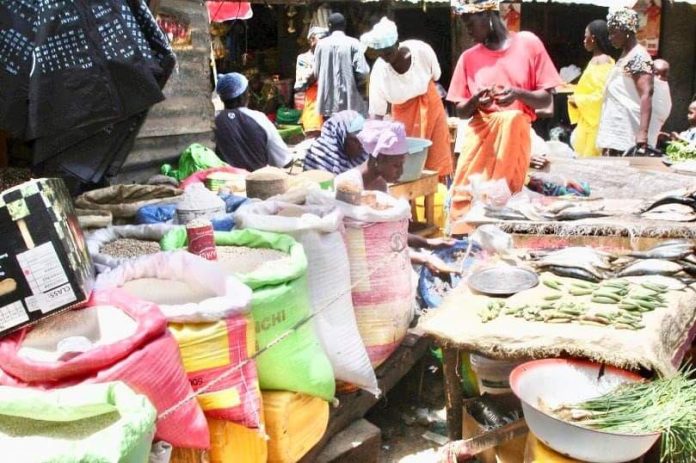By Makutu Manneh
For the past three years, the prices of essential commodities continue to soar in the country. The issue—which is a hot-topic discussed in every nook and cranny—seems far from abating.
For Yassin Saidy, mother of four, the frequent changes in the prices of essential commodities increased her expenses and reduced the family meals to two a day. Sometimes they don’t have dinner. She said her husband is a labourer (moulding bricks) whose earning cannot solve their daily needs. Moulding bricks in the country barely earns one D300 per day.
“I have to support him in taking care of the family. Essential commodities are really expensive and seriously affecting my family’s living,” she said.
Ms. Saidy sells vegetables by her compound gate in Sukuta. Whatever she earns goes to the family’s feeding.
Saidy’s situation is not unique. Life is becoming harder by the day for Abdoulie Touray, a tailor in Brusubi Phase 1 and breadwinner of his family. Mr Touray earns better during Muslims feasts (‘Koriteh’ and ‘Tobaski’).
But the persistent surge on the prices of cooking ingredients at the market sometimes make him doubt his wife when she demands more money for food stipends. As an average Gambian trying to feed his family, Touray confesses that they live from hand to mouth.
“Being responsible for an extended family in this situation where all food items are expensive is stressful,” he bemoaned.
Saidy and Touray’s conditions are that of poverty. A fact disclosed recently by The Gambia Poverty and Gender Assessment 2022 Report. The report indicated that The Gambia’s poverty rate has increased from 45.8 per cent in 2019 to 53.4 per cent in 2022 largely due to covid-19.
What are the factors?
According to government authorities, the factors attributed to the price hikes are both internal and external.
The Gambia Competition and Consumer Protection Commission (GCCPC) said the internal factors include the inefficiency of the Gambia Ports Authority (GPA), depreciation of the dalasi and the administration and regulatory charges on essential commodities.
GCCPC reported that the increase in regulatory fees may be deemed small but their effect, like any other cost, is always immediately and fully passed onto consumers.
The former Minister of Finance and Economics Affairs, Mambury Njie in February 2022 informed parliament that the reason for the increase in essential commodities was as a result of the Covid-19 Pandemic. The Ukraine-Russia war also another external factor attributed to price hike in the country.
October and November Prices of Essential Commodities:
In October 2022, these are the prices of some basic commodities: A bag of American Rice (50kg) costs D1,700; a bag of Fas Rice (50kg) costs D2,050; a bag of sugar costs D2,300; a bag of onion costs D825; a gallon of oil costs D2,800; a bag of potato costs D850.
Going back to the markets on 10th and 11th November 2022, the prices of these commodities have increased. The price of 50kg American Rice rises to D1, 750; a bag of Fas Rice rises to D2, 100; a bag of sugar now costs D2, 325; a bag of onion costs D850; a gallon of oil costs D2, 850, a bag of Irish potato now costs D975.
Other commodities whose prices have increased are: a cup of oil costs D22; a cup of palm oil costs D25; 900g Jadida Butter costs D800; Armanti Mayonnaise-5kg costs D980; a carton of laundry soap costs D350; a carton of frozen chicken laps costs D1,050; a kilo of beef and bone costs D300 while a kilo of beef steak costs D350.
It is not just the prices of the abovementioned commodities that are expensive in the country. Even vegetables produced in the country do not have a fixed price.
Gambians Are Not At Ease
Price hike is a top priority among the plethora plights Gambians are grappling with. Even the Vice President of The Gambia, Alieu Badara Joof, recognised this fact as he disclosed early this year that Gambians are no longer at ease and they have great expectations.
“Vegetables are expensive in the country. Every day you experience changes in the prices of vegetables in the market,” said Awa Bojang…
Amie Sarjo goes to the market daily anticipating an increase in the prices of commodities. This medium met her at the Bakoteh market while she was shopping for their family’s lunch. Like scores of Gambians, Sarjo opined that there is no price control in the market and as a result, she has to plan her daily expenses well to avert shortcomings.
Cherno Barry, a corner shopkeeper, said the increase in the prices of commodities is not their fault as they also buy the items at a high cost. He said it’s not his will to sell food items at a high price because he has a family and the situation affects him too.
“My customers complain to me every day, but I cannot do anything about it,” he said. “I am selling in this shop to make a living so I cannot sell at a loss.”
Fatoumatta Ceesay, who this medium met at Brikama market, said the aforesaid market was once a place where many ran to buy produce due to the availability and affordability of basic commodities.
But things have changed. There too, she said, prices of commodities are expensive.
Gambian Economist Proffers Solutions
Gambian economist Mamadi Kurang said the depreciation of the dalasi is one of the reasons for price hike in the country.
According to him, the dalasi is losing value due to the high demand of the dollar for importing and the low supply of dollars caused by a drop in tourism and low exports.
“So when the dalasi depreciates, the import cost of basic commodities will increase,” he said.
“Another cause of the scarcity of the dollar and hence depreciation of the dalasi is because of lack of control of discretionary government expenditure and lack of local industries to substitute for import of basic commodities.”
He said the possible solution to this situation is to have a better government initiative and efforts to boost the tourist industry in order to generate more foreign currency, improve investment in agriculture and local cottage industries to reduce their dependency on importing basic commodities as well as tackle corruption and improve management in government.
He said also a proper management and control of government expenditure to ensure that unproductive expenses such as luxury cars, fuel and per diem are reduced.
GCCPC’s Recommendation
GCCPC recommends GMA charges on freight be revisited to exclude essential commodities as it was in the 2013 schedule.
The commission recommends Food Safety and Quality Authority (FSQA) charges to be revised in order to reduce the burden on essential commodities dealers (currently, importers are paying for importation, inspection and storage), and also recommends Central Bank of The Gambia (CBG) to solve the shipment challenges faced by importers, for the banks to continue supporting the availability of the US Dollars and other major currencies.
The commission further recommends the Ministry of Finance and Economic Affairs (MoFEA) to eradicate delays at the level of the Gambia Ports Authority (GPA), while GiEPA and the Ministry of Agriculture to promote investment in import substitutes.
Meanwhile, efforts were made to speak to the Ministry of Trade but to no avail.


















